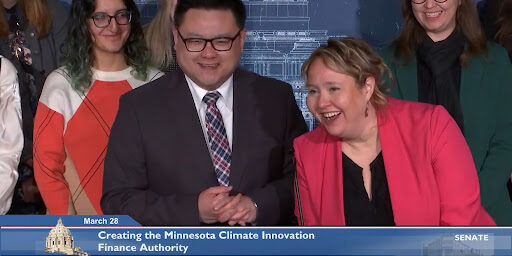MnCIFA is in Omnibus bills, but needs more funding. Take Action Now.
By Arianna Genis, MNIPL Legislative Affairs Policy Fellow
Latest Update May 1, 2023 : On April 24th, MN House voted on the Jobs Omnibus bill, which included $25 million for the Minnesota Climate Innovation Finance Authority (MNCIFA)! This is great news because MNCIFA was already allocated $20 mil in the Energy Omnibus bill voted on in March.
Our goal continues to be that MNCIFA be fully funded at $45 million to help ensure that Minnesota’s transition to clean energy be powerful, scaled, and equitable.
We need the House Jobs conference committee and House Energy conference committee to keep the levels of funding currently allocated for MNCIFA. Unfortunately, the Senate Jobs Omnibus bill does not include the $25 million and the Senate Energy Omnibus included only $5 million. Please call your legislators and tell them to maximize climate action by fully funding MNCIFA. To learn more, read on here or read this action alert.
MNCIFA is a key to accelerating MN’s energy transition because: 1) It attracts private finance to renewable energy and sustainable building practices; and 2) It positions Minnesota favorably in the state competition for federal funds from the new Greenhouse Gas Reduction Fund –perhaps $350 – $400 million or more.
With MNCIFA sufficiently funded, our transition to clean energy can be equitably scaled across Minnesota. MNCIFA can multiply the impact of one-time surplus dollars over the next 10 years and beyond.
Please call your legislators and legislative leaders ASAP and ask them to maximize climate action and help Minnesota by providing $45 million in funding for the MN Climate Innovation Finance Authority.
[Look up your MN Representative here: https://www.gis.leg.mn/iMaps/districts/]
[Look up your MN Senator here: https://www.gis.leg.mn/iMaps/districts/]
Minnesota Speaker of the MN House Melissa Hortman – 651-296-4280
Minnesota Senate Majority Leader Kari Dziedzic – 651 296-7809
Also, contact the following members of the Environment, natural resources, climate, and energy finance and policy conference committee. Ask them to ensure that the final bill includes $20 million for MNCIFA, to keep what was allocated in the House bill.
Sen. Nick Frentz: travis.urness@senate.mn Rep. Rick Hansen: rep.rick.hansen@house.mn.gov
Sen. Foung Hawj: maikao.vue@senate.mn Rep. Patty Acomb: rep.patty.acomb@house.mn.gov
Sen. Tou Xiong: ryan.russell@senate.mn.us Rep. Athena Hollins: rep.athena.hollins@house.mn.us
Sen. Jennifer McEwen: jack.fischer@senate.mn.us Rep. Sydney Jordan: rep.sydney.jordan@house.mn.us
Sen. Julia Coleman: sen.julia.coleman@senate.mn.us Rep. Larry Kraft: rep.larry.kraft@house.mn.us
AND contact the following members of the Jobs and Economic Development Conf. Committee (Ask them to adopt $25 million for MNCIFA to match what House passed in their Omnibus bill):
Sen. Bobby Joe Champion: 651-296-9246 | sen.bobby.champion@senate.mn
Sen. Zaynab Mohamed: 651-296-4274 | This mail form.
Sen. Jennifer McEwen: 651-296-4188 | This mail form.
Sen. Grant Hauschild: 651-296-1789 | This mail form.
Sen. Heather Gustafson: 651-296-1253| This mail form.
Rep. Hodan Hassan: 651-296-0294 | rep.hoddan.hassan@house.mn.gov
Rep. Liz Olson: 651-296-4246 | rep.liz.olson@house.mn.gov
Rep. Jay Xiong: 651-296-4201 | rep.jay.xiong@house.mn.gov
Rep. Michael Nelson: 651-296-3751 | rep.michael.nelson@house.mn.gov
Rep. Kaela Berg: 651-296-5387 | rep.kaela.berg@house.mn.gov
LEARN MORE — HOW WOULD MNCIFA WORK?
Read our fact sheet here. And a brief from the UMN’s Gabe Chan and Matthew Grimley here.
A $45 million state commitment to MNCIFA will make Minnesota competitive for at least $350 million of federal funds, and leverage between $3 to $10 of private investment for every $1 of public funds. As an example, Connecticut’s state investment of $322 million via its version of a state climate finance authority has created over $2 billion worth of clean energy projects.
100% Carbon-Free Electricity by 2040 is the law of the land. Minnesota needs the funding and infrastructure to accelerate the transition to clean energy, leaving no one behind. MNCIFA can address the number one barrier to adoption of clean energy technologies – the upfront cost – by helping consumers and businesses access financing while reducing energy costs.
There are tens of billions of dollars of projects needed in Minnesota that could help address the climate crisis–MNCIFA can be instrumental in realizing them. For example, we need new buildings to address the housing crisis that also address climate change. New projects that require prevailing wages for labor hired lead to an investment in the clean energy workforce that helps address climate change. New water infrastructure facilities for towns and cities can be made resilient, less costly to operate, and near zero emission with renewables and battery storage.
How would residential projects, homeowners, and renters benefit from MNCIFA? Read our fact sheet here.
Why is Minnesota being looked at nationally on this issue? Read this summary from national policy expert Jordan Haedtler.
Clean Energy Investments Possible to fund with MNCIFA
- Community-wide projects like geothermal or district heating and cooling, community solar, or microgrids that require significant coordination and pre-design.
- Lower- to moderate-income households and businesses that are perceived as riskier borrowers or otherwise don’t currently meet the requirements of private lenders. Without upfront capital to take advantage of tax rebates, many people will be left out of opportunities to choose renewables and save money.
- Agricultural Sector: Farms, strapped for time and people power, find it difficult to navigate funding and find technical assistance. New crops need funding to get through the “Commercialization Valley of Death.”
- Smaller KW projects: Because of increased costs per transaction, banks prefer to lend to larger projects, often leaving smaller projects unfunded.
- Influencing Building Standards: Public investment of sufficient scale and capacity, when tied to zero-emission building standards, can help drive markets towards better outcomes (for example, affordable housing with extremely low energy bills).
MNCIFA IN THE NEWS:
Sahan Journal, Apr 10, 2023: Minnesota ‘green bank’ proposal aims to speed climate friendly projects in underserved communities
WDAY Radio, March 29, 2023: Minnesota Lawmakers proposing Green Bank to fund Clean Energy Projects
KTTC News | Rochester, MN, March 23, 2023: MN lawmakers aim to create new ‘green bank’ to fund clean energy projects
Minnesota Reformer, March 22, 2023: Op-Ed: Here’s how we can equitably fund Minnesota’s transition to a carbon-free system
Mn House Session Daily, March 21, 2023: Climate finance authority could unleash federal funds upon state projects
Duluth News Tribune, March 16, 2023: Reader’s View: ‘Green banks’ can help shift to clean energy
MNCIFA HEARINGS:
Since being introduced, MNCIFA has had various committee hearings and a few stories. On March 23, 2023, legislative leaders, Senator Tou Xiong and Representative Emma Greenman along with our partner Amber Naqvi and others held a press conference to talk about MNCIFA and the importance of its establishment in MN’s transition to clean energy, equitably.
MNCIFA had the following hearings:
March 13, 2023 – Senate Committee on Energy, Utilities, Environment and Climate
March 21, 2023 – House Climate and Energy Finance and Policy
March 23, 2023 – House Labor and Industry Finance and Policy
March 23, 2023 – Senate Committee on Commerce and Consumer Protection
March 29, 2023 – House Climate and Energy Finance and Policy Committee Omnibus Bill vote
March 29, 2023 – Senate Committee on Energy, Utilities, Environment and Climate Omnibus Bill vote
April 11, 2023 – House Ways and Means Committee
*Senate Finance Committee hearing pending

